TD Investment Risks & Solutions
Unlike other forms of investing, the risks associated with trust deed investments are all identifiable and may be realized up front before making the investment. Therefore, lenders must be familiar with these common investment pitfalls so they may best be avoided.
1. Market Values are accessed by an independent appraiser upon origination of the loan. However, there is no assurance that the property’s value will remain consistent or increase over the term of the loan as economic conditions fluctuate.
Solution: For this reason, Church Capita; will only lend up to 65% of the present market value to allow for a minimum of 35% fluctuation of value. Investors that require additional security should invest in loans with even lower LTVs and select loans on properties in their own immediate area.
You are most likely to understand the market values of properties within your own stomping grounds making you a more savvy investor (not to mention you can drive by your properties to keep an eye on their condition).
REQUEST OUR LIST OF TRUST DEED INVESTMENT OPPORTUNITIES TODAY
Fill out the form below and one of our loan placement specialists will contact you shortly. Thank you.

2. A Borrower’s Ability to Repay may be affected over the term of the loan. In any economy, good or bad, an individual may still loose their job, a loved one, or requre medical attention, all events that seriously would effect a borrower’s ability to make monthly payments or pay off the loan at maturity…
3.Bankruptcy can stall the foreclosure process and legal fees may be incurred. Also, in some rare instances the court may modify the terms of the loan as part of a reorganization plan.
Solution: Remember that bankruptcy can only stall the foreclosure process not stop it indefinitely, your principal remains secured according to the deed of trust. Because trust deed investments are not liquid they should not be made if an investor requires immediate access to their principal or depends on the monthly interest as their sole means of livelihood. Just be sure to have adequate means or other streams of dependable income to rely upon should payments be stalled. Also, even though legal fees may be incurred they are often times recoverable as stated on the Deed of Trust.
4.Environmental Contamination of a property will greatly reduce the value of a property due to the high costs associated with removing such contamination. Church Capital will in most cases not require toxic contamination reports or site assessments when underwriting the loan, but will in special circumstances when the existence of contamination is questionable. Solution:
Do not lend on a property that may contain environmental contamination. Church Capital makes it a practice not to lend on gas stations and auto repair facilities because of the increased risk of such contamination. The Investors can lessen their potential liability for environmental clean-up costs, uninsured casualties and other liabilities relating to the ownership of the real property by taking back title to the real property through a Transfer Entity of which the Investors would be the limited partners or members.
5. Presence of Junior Liens may increase the risk of loss of principal of the senior lien. The presence of junior liens on the property means that the borrower has less equity in the property. When a borrower has little equity in a Security Property, they may be less committed to developing or maintaining the property or servicing its debt since it has so little money at risk.
Solution: Even though the obligations of other liens may adversely effect the ability of the borrower to make regular payments it does not affect the obligation to repay your original principal. If your lien is in the first position no other lien may take priority over yours except for a tax lien. It is Superior’s responsibility as the loan servicing agent to monitor and be sure that all property taxes are paid on time. Also, Church Capital requires the borrower to pay for an additional third party to monitor property tax payments on behalf of the lenders. Should the borrower not pay their property taxes it is considered a default by the deed of trust and the lenders may take action to protect their principal investment.
6. Trust Deeds are Not Insured by the FDIC or any other government agency. Church Capital also does not guarantee the sucess of any investment.
However, funds deposited into Church Capital’s loan funding and servicing trust accounts are insured by the FDIC up to the federal limit per a lender. Church Capital is regulated by the California Department of Real Estate , the California Departments of Corporations and the National Mortgage Licensing System & Registry.
Trust deed investments are not liquid investments and therefore should not be obtained by those who require immediate access to their principal.
Church Capital’s Risk Control Strategies
Church Capital exercises several strategies during loan underwriting and approval to mitigate the risks associated with trust deed investment. These preventative strategies provide our lenders with secure investment options:
Equity – A minimum 35% equity, to secure each property.
1st Deed of Trust Only – Placing our lenders in the most secure position to protect principal.
No Pools or Funds – Investors may hand pick each loan, it’s not a pool of investors where lenders are blind to what investments are made on their behalf. Also, this way lenders earn higher returns by not having to pay any bonuses, auditing, accounting, and management fees in addition to servicing fees.
Exit Strategy- Borrowers are required to provide a sound strategy for repaying their loan by the maturity date. Church Capital also checks in with borrowers at timed intervals to ensure that borrowers will successfully exit their loan by the end of its term
Verified Income- Each Borrower’s employment and income is verified by several means.
Clear Title- In addition to originating the loan, Church Capital makes sure no liens or judgements remain (and if so are settled) before closing
Rigorous Underwriting- Each loan undergoes a strict underwriting process tailored to each loan purpose and property type proprietary to Church Capital.
Real Market Value – Church Capital does not want inflated values from its ordered appraisals. To evaluate the property value Church Capital utilizes its own proprietary method in addition to the appraisal. Often times a member of the Church Capital staff will personally visit the property and evaluate its condition. If necessary a BPO will also be obtained.
Other Considerations
These factors may also be taken into consideration when evaluating a potential investment:
Additional Collateral –On occasion a borrower may pledge additional collateral such as another property, a personal guarantee, a note hypothecation, an assignment of rents or other personal property. This additional collateral provides investor’s with additional security when making an investment.
Income Property – Some property types produce rental income. In this case monthly payments are not just being paid out of pocket by a borrower but with income produced by the property, giving investors peace of mind in knowing the borrower can better afford monthly payments.
Prepaid Interest – In this instance a borrower has already prepaid a certain number of monthly payments. Some investors enjoy the security that a certain number of payments are guaranteed to be received.Repeat Borrowers-Many of our borrowers are real estate professionals that purchase and flip properties. These repeat borrowers have a proven record of quick payoffs and regular payments




